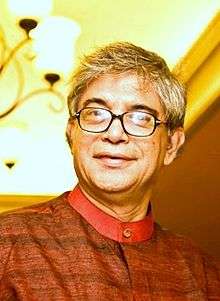Mustafa Jabbar
| Mustafa Jabbar | |
|---|---|
 | |
| Born |
August 12, 1949 Netrokona |
| Nationality | Bangladeshi |
| Education | MA (Journalism) |
| Alma mater | University of Dhaka |
| Children | 3 |
Mustafa Jabbar (Bengali: মোস্তাফা জব্বার; born 12 August 1949) is a Bangladeshi businessman and entrepreneur.He is best known for the closed source software Bijoy. His Bijoy Bangla Keyboard and software has become the symbol of success of Software industry of Bangladesh and it has also been considered the icon of Bengali language in the Digital age[1] having published the Bijoy Bengali Keyboard, the first Bengali keyboard in 1988, which was most widely used Bengali input method around the world until the release of Unicode based Avro Keyboard.[2] He is the only patent holder of any ICT related product (Bijoy Keyboard) till now. His slogan Digital Bangladesh is the most popular words in Bangladesh. He has not only coined the words but defined what he meant by the term. He has written the first book on this subject and is responsible for organising a movement on Digital Bangladesh. His works for the development of the digital education system is leading the country towards a new era. He is leading the ICT industry as the President of Bangladesh Computer Samity, the national ICT organisation of Bangladesh.[3]
Early life
Mustafa Jabbar ancestral Home is a remote village called Khaliyajuri in Brahmanbaria district.He was born on Ashuganj Upazilla in Brahmanbaria District.His father was Abdul Jabbar Talukdar,farmer & jute business and his mother Rabeya Khatun was a housewife.He passed his intermediate exam from Dhaka College.In 1968,he enrolled in the Departement of Bangla at Dhaka University and completed his BA in 1972 and MA in 1974.[4]
Working Area
He started his career as a journalist on 16 January 1972.He had to change his profession as that newspaper he was working namely Ganakantha was compelled to be ceased its publications in January 1975. Doing some businesses in Media, Travel & Tour Operation, Printing, Publishing and Computer Reselling, he is now engaged in Software Development, Providing IT Education, Developing IT Enabled Educational Curriculum, Developing Course Materials for ICT Education, Creating Software and providing ICT Services, Doing Researches on ICT, ICT Journalism and writing Books on ICT and other subjects. His first novel named Nokshotrer Onger was published in a book form in 2005. His second novel named Suborne Shekorh was published in the Fortnightly Tarokalok's Eid issue of 2006. Its book edition is under process of printing. He was also involved in developing a local laptop brand named BIJOY. Mustafa Jabbar is the technology leader and promoter of ICT in Bangladesh. He is the founder member of Bangladesh Computer Samity and Bangladesh Association of Software and Services. He has been elected President of Bangladesh Computer Samity for the fourth term and retied from his office frm 1 April 2014 due to regulatory bindings. He was also the founder vice president of BASIS. He is more recognised as the local language solution provider in Bangla, Chakma, Asamese, Hindi & developer of Bijoy Bangla Keyboard & Software and expert in Graphics-Multimedia. He has developed Bangla Braille publishing system which enables blind people to use Bangla Braille in computer. He is also regarded as the Master of Digital Bangla Font designing. He has developed Bijoy Library, a library management Software which is being used by famous libraries of Bangladesh including Brirish Council. He has developed a software named Bijoy Shishu Shiksha for pre school kids. He has developed Prathomik Computer Shiksha, based on Text Books published by NCTB. He has established a large number of Schools in Bangladesh including Computer based Ananda Multimedia School and Bijoy Digital School.[4] He is involved in writing text books on Computer in Bangla and English. He has done translation works from Bengali to English and English to Bengali. He has checked the translation work of Windows 7.[5]
In Liberation War
He was a member of Mujib Bahini (Bangladesh Liberation Force) in 1971 and participated in the War Of Liberation of Bangladesh. He was involved in the movement of freedom of press and was actively associated with the Dhaka Union of Journalists. He was elected as the Organising Secretary of Dhaka Union of Journalists(DUJ).[5]
Award
- Best Software Award from West Bengal State Government
- Daily UttorBangla award
- PIB's Sohel Samad Award
- City IT Award
- BASIS Lifetime Achievement Award
References
- ↑ http://www.bijoyekushe.net/html/backup/mustafa_life.php
- ↑ "An amazing journey from Shahid Lipi to Avro". The Daily Star.
- ↑ http://www.bcs.org.bd/ec_members.htm
- 1 2 "Bijoy Ekushe". bijoyekushe.net.
- 1 2 "Speakers - Mustafa Jabbar - Digital World-2015". digitalworld.org.bd.